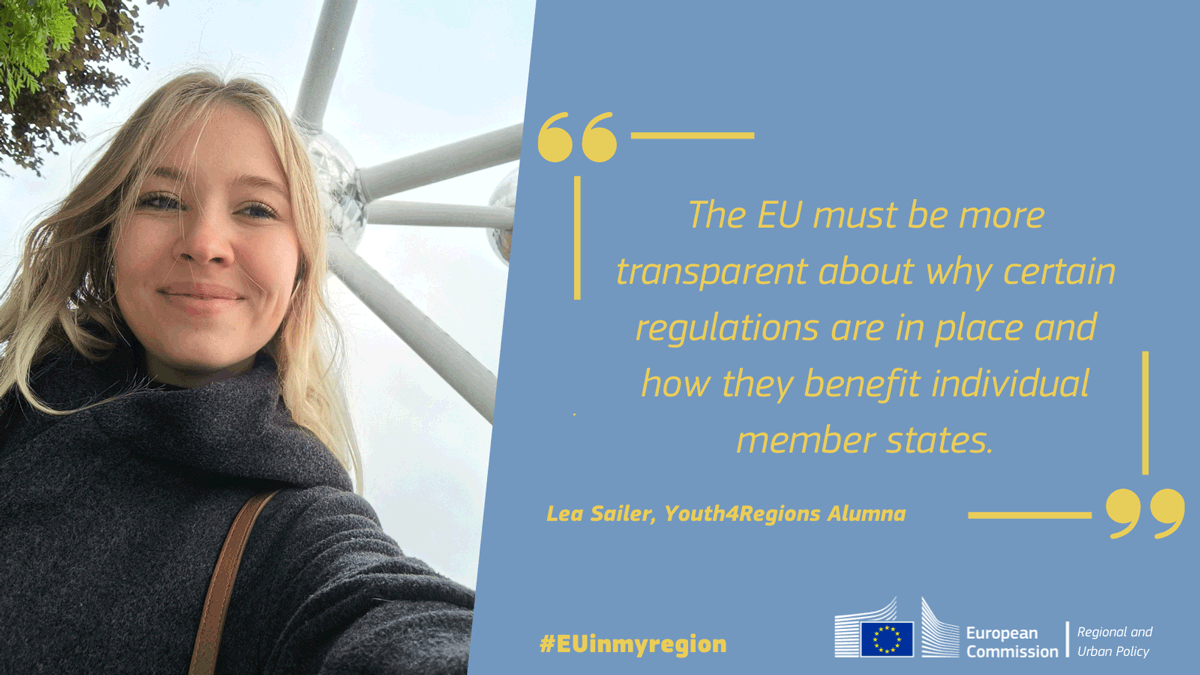Youth4Regions Series ep. 3: "Behind Brussels' Doors: How I Explored EU Politics and Want to Change Public Perception"
- 29 Jan 2025

“These new lids on the bottles are driving me crazy!”
“The cucumbers are no longer allowed to be curved? It’s so ridiculous!”
“The renaturation law will ruin our farmers.”
“They are wasting our taxes.”
Sentences like these are common within the Austrian population. Austria’s relationship with the EU has long been marked by scepticism, often fueled by limited knowledge and the tendency to blame "those in Brussels" for national issues. When I visited Brussels for the Youth4Regions program, it was my first time there. The heart of the EU- what shall I expect? Despite my interest in politics, my view of the EU was vague—like a distant institution most people never set foot into. I hoped to gain a clearer understanding of how it functions.
Before going, I reflected on why so many Austrians distrust the EU. While I’ve generally trusted that the EU acts in citizens' best interests, many others feel differently. A June 2024 survey conducted in Austria, showed 76 percent of respondents believed that the country should remain in the European Union. But at the same time in 2023, only 42 percent of Austrians regarded the EU-membership as something positive. Many other countries such as Italy, the Czech Republic, Hungary and France are experiencing similar trends. The UK was the first country to leave the EU in 2020.
In Austria, the sentiment is notably reflected in the growing popularity of the Freedom Party (FPÖ). The head of the Party, Herbert Kickl, does not currently want Austria to leave the EU, but often portrays the EU as a threat. Before the European election, one of their posters said: “Stop EU madness”. The FPÖ won 25.4% in the European elections and 28.8% in the national elections on September 29th.
So why is the EU unpopular in many member states, including Austria?
Skepticism and how to improve it
Austria joined the EU in 1995 and still struggles with concerns over its sovereignty. Many feel that the EU membership threatens its neutrality. As someone who grew up with the EU, I don’t feel this as strongly. Austria’s political landscape, especially parties like the FPÖ, has nurtured this scepticism by framing the EU as an external force ignoring local realities.
During my time in Brussels, I visited institutions, listened to press conferences, and spoke with EU staff, who showed deep knowledge and competence. In sessions about cohesion policy, I realized how many local projects are funded by the EU, though people often don’t realize it. This experience helped me understand overlooked details.
I can still see why some EU regulations, like the infamous cucumber curvature rule (abolished in 2009), seem absurd. While such rules aim to ensure standardization, the reasons behind them often remain unclear to the public. The EU could do better at explaining its decisions to prevent poor communication. This is probably the key to changing the narrative. The EU must be more transparent about why certain regulations are in place and how they benefit individual member states. Engaging directly with local communities, understanding their concerns, and demonstrating benefits will help reduce the feeling of alienation.
Education also plays a crucial role. Many Austrians, have a limited understanding of how the EU functions. By offering more accessible resources, the EU can help demonstrate that it is not an outdated bureaucracy but a collection of nations working together for shared goals.
A Personal Shift in Understanding
After attending the Youth4Regions week, I gained a new understanding of how the EU operates. I saw firsthand the complexity of the issues it tackles and the effort it puts into balancing the diverse needs of its member states. Learning about cohesion policy revealed how many small projects the EU supports, though people often don’t realize the EU is directly involved in their villages, roads, or food.
While the EU has its flaws and there is significant room for improvement, I can now see even clearer that many of its policies are designed with the long-term well-being of all citizens in mind.
The EU is very complex. And I understand that if someone does not have the time or energy to learn more about it, it might seem as something abstract and confusing. But going forward, I hope to contribute to a more informed conversation about the EU in Austria. By sharing what I’ve learned, I aim to help bridge the gap between Austrian citizens and the European project, creating a dialogue that is critical yet constructive.
In the end, the more we understand about something, the less scared we are of it. And the less we are scared, the easier it is to get along.


